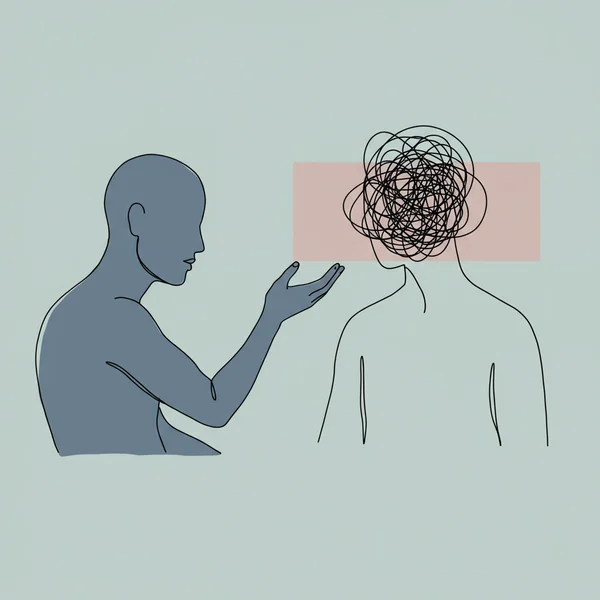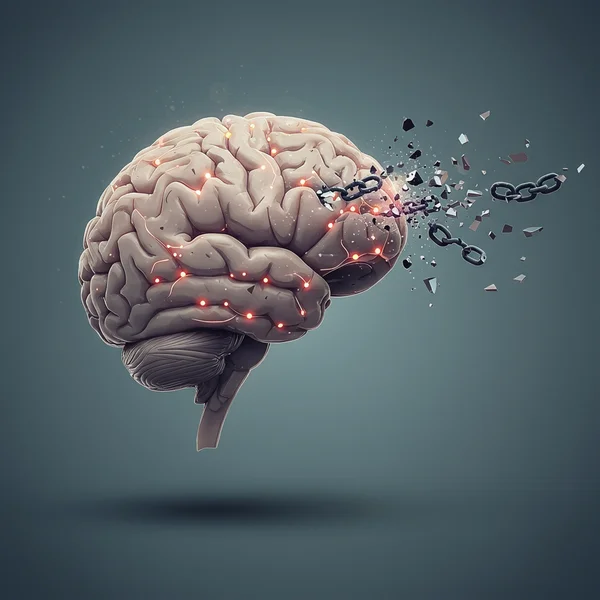Online Alexithymia Test for Adults: What is Alexithymia?
August 4, 2025 | By Caleb Sterling
Have you ever felt disconnected from your own emotions, struggling to identify or describe what you’re truly feeling? You might know something is stirring inside, but finding the right words feels impossible. If you've ever felt this way—like your emotions are a language you can't speak—you're likely encountering what's often called 'emotional word blindness,' a key aspect of alexithymia. If you've ever wondered, "How do you tell if you have alexithymia?", this comprehensive guide is for you. We'll explore what this trait is, its common signs, and what might cause it.
Understanding your inner world is the first step toward personal growth and richer relationships. For those curious about their own emotional landscape, a structured self-assessment can provide valuable clarity. You can begin this journey of discovery by taking our free online alexithymia test.
Alexithymia Defined: More Than Just "Word Blindness"
So, what is alexithymia? The term, coined by psychotherapist Peter Sifneos in 1973, literally means "no words for emotions" (a- for lack, lexis for word, and thymos for emotion). It’s not a mental disorder but a personality trait characterized by a marked difficulty in recognizing, understanding, and describing one's own emotions.
People with high alexithymia traits aren't emotionless; they experience feelings just like anyone else. The real challenge is how your mind processes those emotions. Imagine your feelings are written in a language you can't read. You know there's a message, but you can't decipher its meaning. This gap can lead to confusion, frustration, and difficulties in connecting with both yourself and others.

Understanding the Core Traits of Alexithymia
Alexithymia typically shows up in a few key ways. These traits exist on a spectrum, meaning everyone possesses them to some degree. The core features include:
- Difficulty identifying feelings and distinguishing between emotions and bodily sensations of emotional arousal. For example, someone might feel their heart racing but not know if it’s due to anxiety, excitement, or anger.
- Difficulty describing feelings to other people. This goes beyond a limited emotional vocabulary; it's a genuine struggle to put internal experiences into words.
- An externally oriented thinking style. Individuals with high alexithymia traits tend to focus on external events and details rather rather than their inner emotional world. They are often practical, logical, and concrete thinkers.
Is Alexithymia a Disorder, Condition, or Trait?
This is a common and important question. Alexithymia is not classified as a standalone mental disorder in major diagnostic manuals like the DSM-5. Instead, it is considered a personality trait or a subclinical condition. It can coexist with and contribute to various mental health conditions, including depression, anxiety, and eating disorders, but it is not a diagnosis in itself.
Framing it as a trait helps ease the stigma, letting us understand it better. It's simply a way of being, a particular style of emotional processing that can present both challenges and strengths. Recognizing these tendencies is the first step toward managing its impact on your life.
Recognizing the Signs: Common Alexithymia Symptoms
Since alexithymia is a spectrum trait, its signs can look different from person to person. Still, some common patterns do emerge. If you recognize several of these in yourself, it may indicate that you have high traits of alexithymia.
Difficulty Identifying and Distinguishing Feelings
This is the most defining symptom. You might feel a general sense of unease or agitation but struggle to label it. When asked, "How are you feeling?" your answer might be a vague "I don't know" or "Fine," even when you suspect something more is going on beneath the surface. This can make it difficult to understand your own needs and motivations.
Struggling to Express Emotions Verbally
Are you constantly asking yourself, "Why am I so bad at communicating my feelings?" For individuals with high alexithymia, this is a daily reality. You may find it much easier to describe the factual details of an event than the emotions it stirred up. This can make deep, emotionally intimate conversations feel challenging or even pointless. If you're curious about this pattern, an alexithymia questionnaire can offer a starting point for reflection.

A Practical, Logic-Oriented Thought Style
People with alexithymia often have a thinking style that is highly logical, concrete, and focused on the external world. They may be excellent problem-solvers and planners. However, they might show limited interest in introspection, fantasy, or daydreaming. They prefer to deal with tangible issues rather than abstract emotional concepts.
Unpacking the Roots: What Causes Alexithymia?
There is no single cause of alexithymia. Research suggests that it likely develops from a complex interplay of genetic, neurological, and environmental factors. Understanding its potential origins can provide deeper insight into the trait.
Neurological & Genetic Influences
Some studies indicate that alexithymia may be linked to differences in how brain regions responsible for emotional processing communicate. Areas like the anterior cingulate cortex and the insula, which help us become aware of our feelings, may function differently. There may also be a genetic component, suggesting a predisposition to the trait can be inherited.
Developmental Factors & Early Experiences
Our childhood environment plays a crucial role in how we learn to understand and express emotions. If a child grows up in a home where emotions are ignored, discouraged, or invalidated, they may not develop the skills to process their feelings effectively. This is not about blame; sometimes, caregivers are simply passing down the emotional skills they themselves were taught.
Alexithymia and Trauma: Is There a Link?
There is a strong connection between alexithymia and trauma. Is alexithymia a trauma response? For many, yes. When faced with overwhelming emotional or physical pain, the mind can develop a protective mechanism by dampening or disconnecting from emotions. This "numbing" can become a long-term pattern, evolving into what is known as secondary alexithymia.

Different Types of Alexithymia: Primary vs. Secondary
Understanding whether alexithymia is a lifelong trait or a response to life events is key. This distinction is captured in the two main types of alexithymia.
Primary Alexithymia: Innate Tendencies
Primary alexithymia is considered an enduring personality trait that is present from early in life. It is thought to be more closely linked to genetic and neurological factors. For individuals with primary alexithymia, this way of processing the world has always been their baseline.
Secondary Alexithymia: An Acquired Response
Secondary alexithymia develops as a reaction to significant psychological trauma, prolonged stress, or severe illness (like PTSD or chronic depression). It is a defense mechanism—a way for the mind to cope with experiences that are too painful to process emotionally. Unlike primary alexithymia, secondary alexithymia may lessen if the underlying trauma or condition is addressed. Exploring your emotional profile with a reliable screening tool can be a useful step in this process.
Alexithymia vs. Other Emotional Experiences: Clarifying Differences
Alexithymia is often confused with other conditions like apathy, emotional numbness, or even autism. Clarifying these differences is essential for accurate self-understanding.
How Alexithymia Differs from Apathy or Emotional Numbness
Apathy is a lack of interest or motivation, while emotional numbness is the inability to feel emotions at all, often temporarily. A person with alexithymia feels emotions, but they can't identify or articulate them. The feeling is present, but the label is missing.
The Relationship Between Alexithymia, Depression, and Anxiety
Alexithymia is not the same as depression or anxiety, but they frequently co-occur. The inability to process emotions can lead to a build-up of unresolved feelings, which can manifest as chronic anxiety or the low, heavy feeling of depression. In fact, many people seeking help for depression discover their underlying challenge is alexithymia. This is especially true for neurodivergent individuals, as there is a notable overlap between alexithymia and autism.
Taking the Next Step in Your Emotional Exploration
Understanding what alexithymia is—a trait, not a flaw—is a powerful act of self-compassion. It opens the door to developing new strategies for navigating your inner world and connecting with others. Recognizing these patterns is not an endpoint but a starting point for growth.
If this guide resonates with you, you're not alone. The journey to emotional clarity begins with a single step. Why not take that step today? Visit AlexithymiaTest.com to take our free, science-informed test. You can choose a quick summary score or opt for our unique AI Personalized Report for deeper insights and actionable advice.

Frequently Asked Questions About Alexithymia
What are the symptoms of alexithymia?
The primary symptoms include difficulty identifying your own feelings, trouble expressing emotions to others, and a logical, externally-focused thinking style. You might also notice a limited fantasy life or find it hard to understand the emotional cues of others.
How do you tell if you have alexithymia?
While a formal assessment requires a clinical professional, a good first step is self-reflection. If you consistently struggle to name your feelings or find yourself disconnected from your inner world, you may have high alexithymia traits. Taking a well-regarded self-assessment like the OAQG2 test on our site can provide valuable initial insights.
Can you self-diagnose alexithymia?
No, alexithymia is not a formal medical diagnosis you can give yourself. However, you can identify that you have traits consistent with alexithymia. Online screening tools should be used for informational and self-exploration purposes only. If you have significant concerns, it's always best to consult a mental health professional.
Can a person with alexithymia cry?
Yes, absolutely. Crying is a physiological response that can happen even when a person can't cognitively label the emotion behind it. Someone with alexithymia might cry from being overwhelmed or stressed without being able to say, "I am crying because I feel sad" or "I am crying because I am frustrated."
How does a person with alexithymia behave?
Behavior can vary greatly, but common patterns include appearing overly logical, practical, or even stoic. They might seem uncomfortable with emotional conversations, change the subject when feelings come up, or describe stressful events with a detached, factual tone. They often listen well but may struggle to offer emotional validation in return.